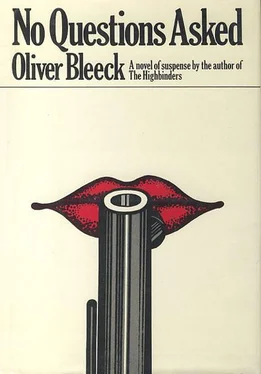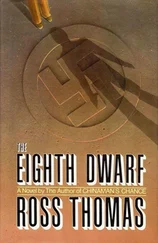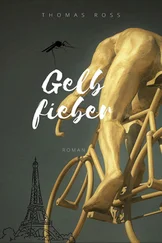Ross Thomas - No Questions Asked
Здесь есть возможность читать онлайн «Ross Thomas - No Questions Asked» весь текст электронной книги совершенно бесплатно (целиком полную версию без сокращений). В некоторых случаях можно слушать аудио, скачать через торрент в формате fb2 и присутствует краткое содержание. Город: New York, Год выпуска: 1976, ISBN: 1976, Издательство: William Morrow, Жанр: Детектив, на английском языке. Описание произведения, (предисловие) а так же отзывы посетителей доступны на портале библиотеки ЛибКат.
- Название:No Questions Asked
- Автор:
- Издательство:William Morrow
- Жанр:
- Год:1976
- Город:New York
- ISBN:978-0-688-03011-7
- Рейтинг книги:3 / 5. Голосов: 1
-
Избранное:Добавить в избранное
- Отзывы:
-
Ваша оценка:
- 60
- 1
- 2
- 3
- 4
- 5
No Questions Asked: краткое содержание, описание и аннотация
Предлагаем к чтению аннотацию, описание, краткое содержание или предисловие (зависит от того, что написал сам автор книги «No Questions Asked»). Если вы не нашли необходимую информацию о книге — напишите в комментариях, мы постараемся отыскать её.
Interestingly, the owner of the book, PI Jack Marsh, has been kidnapped as well. St. Ives soon finds himself involved in a deadly game of deception and murder.
No Questions Asked — читать онлайн бесплатно полную книгу (весь текст) целиком
Ниже представлен текст книги, разбитый по страницам. Система сохранения места последней прочитанной страницы, позволяет с удобством читать онлайн бесплатно книгу «No Questions Asked», без необходимости каждый раз заново искать на чём Вы остановились. Поставьте закладку, и сможете в любой момент перейти на страницу, на которой закончили чтение.
Интервал:
Закладка:
Oliver Bleeck
No Questions Asked
1
The only thing in the mail that day of any interest was the eviction notice. There was also a letter from The Wall Street Journal , which promised that I could get fairly rich if only I would subscribe for just six months, while down in Atlanta Julian Bond had written, wanting to know whether I wouldn’t like to send another $25 to help keep the Republic fairly honest.
I tossed The Wall Street Journal ’s promise into the wastebasket, made a mental note to cut Julian Bond off with $10, and handed the eviction notice to Myron Greene, the lawyer, who had brought my mail up with him that morning.
Myron Greene read the letter slowly and suspiciously, the way lawyers read everything, even the close-cover-before-striking admonition on match folders. He read it once at arm’s length, then put on a pair of grey-tinted aviator glasses, and read it again. After that he shrugged and handed it back to me.
“It’s an eviction notice,” he said.
“I know what it is,” I said. “What I don’t know is what I can do about it.”
Myron Greene glanced around the room and although he must have tried, he couldn’t keep the small expression of disapproval from sliding across his face. He shook his head and said, “There’s really only one thing you can do about it.”
“What?”
“Move.”
I looked around trying to see it through the eyes of some benevolent Christian whom the Goodwill people had sent over and who was viewing it all for the first time. What I was being evicted from was a “deluxe” efficiency on the ninth floor of the Adelphi apartment hotel on East Forty-sixth Street. It was about 425 square feet of steam-heated space that contained virtually everything I owned in the world other than the $9,215.26 in a checking account over which the Chase Manhattan Bank was standing constant vigil.
I decided that even a benevolent Goodwill representative, who had shaped his career out of cheerfully collecting other people’s discards, might have gulped and sighed before agreeing to accept mine. There was a book-lined wall, but most of the books were worn paperbacks except for a leather-bound set of Dickens, although nobody reads Dickens much anymore. The bed was what I think they used to call a studio couch and it was beginning to sag a bit. There was also a leather wing-backed easy chair that I liked a lot and a small Sony color TV set whose predominantly yellowish cast made everyone, especially Sevareid, appear faintly choleric.
Then in front of the Pullman kitchen was the 121-year-old butcher block that I pounded the round steak on. Not far from it against the wall was the high-fidelity set that played just fine even though after I had put it all together there had been a couple of loose wires left over.
On the floor was a rug and on the walls were some prints that I still didn’t mind looking at and in the center of the room, surrounded by six mismatched, straight-backed chairs, was where I took my meals and sometimes laid my money down. It was a hexagonal poker table whose green baize cover was marred by a dark stain that had been caused when a Homicide South detective had got all excited after filling an inside straight and knocked over his Bloody Mary at 5:15 one Sunday morning.
Myron Greene and I were sitting at the poker table, he in his dark blue pin-striped vested suit and I in my terry-cloth bathrobe.
“You have to be in court today, don’t you?” I said.
“How do you know?”
“You’re either going to court or to a funeral. Otherwise you’d be wearing something more dashing. Maybe something in crushed velvet with a few posies appliquéd on the back.” Myron Greene liked to think of himself as a dandy, but he wasn’t too sure about his taste, and he liked me to encourage him.
He glanced down at his suit and brushed away some imaginary lint. “It’s five years old and it still fits perfectly.”
“You haven’t lost any weight in five years.”
“You can be awfully snotty in the morning.”
“I’m always snotty when I get up in the morning without any coffee and somebody hands me an eviction notice. You want some coffee?”
“Is it instant?”
“It’s always instant.”
Myron Greene shook his head. “Then I don’t want any.”
“How about some tea?” I said.
Myron Greene had to think about that because it was a decision, and he never made decisions without weighing the consequences carefully and even judiciously. His inbred caution, along with his brilliant grasp of the law, kept his corporate clients out of trouble and had made him wealthy, if not really rich, although he probably would be that in a few more years.
“All right,” he said. “Tea. No sugar. Lemon, if you’ve got it.”
“I’ve got it.”
I went over to the kitchen, filled the kettle, and put it on to heat. Then I turned, lost another battle with my willpower, and lit a cigarette. This time Myron Greene didn’t try to hide his disapproval.
“You shouldn’t smoke before you’ve had breakfast,” he said.
“I shouldn’t smoke at all.”
“Then why don’t you quit? It’s not all that hard. I did it.”
“You quit five cigarettes a day, tops, and when you did you put on twenty pounds. I think I’ll stay svelte and cough a lot.”
Myron Greene sighed. He seemed to sigh often and deeply when he was around me. He sighed over my profligate ways, my slothful nature, and the company I kept. He sighed because I wasn’t more like him and then sighed again over the realization that if I were more like him, I wouldn’t be his client, and he would have lost his only contact with somebody who inhabited what he thought of as a netherworld peopled by latter-day Robin Hoods and their merry men who raced through life, knew a lot of blondes, and scoffed at their parking tickets because they knew how to get them fixed. If it weren’t for the wife and kids and the money, especially the money, Myron Greene would have liked to have been a slick criminal lawyer who wore flashy clothes and got his name in the paper all the time.
Instead, he settled for clients who had made him a millionaire before he was forty, which enabled him to live in Darien, maintain a summer home in Kennebunkport, drive a $20,000 Mercedes 450 SCL, and keep me on as a client. But I don’t think I was really ever a client of Myron Greene’s. I think I was his hobby.
I set the teapot and a cup and saucer in front of him, went back and got my coffee and the lemon, and sat back down at the poker table. He poured his tea, squeezed the lemon into it, tasted it, and smiled.
“It’s good,” he said.
“It’s Twinings Irish breakfast tea. It’s got a nip to it.”
“Why do you always go to the trouble of making a real pot of tea, but when it comes to coffee you drink that awful instant stuff?”
I shrugged. “I don’t know. I suppose it’s because of that time when I lived in England.”
“When you were with the paper.”
“Yeah. When I was with the paper.”
“That must have been ten years ago now.”
“More like twelve or thirteen.”
I had once written a thrice-weekly column for one of those New York papers that had gone out of business in the mid-sixties. I had written mostly about the quaint ways of New York’s mountebanks and hustlers and con artists and of cops who were honest and brave and of those who were only partly so. Just before the paper folded there had been some talk of syndication, but nothing ever came of it, and largely through chance I found myself doing what I now do for a living, which is mostly waiting for Myron Greene to come calling.
He finished his cup of tea, used his breast pocket handkerchief to pat his lips, since I hadn’t thought to provide napkins, put it back carefully just the way it was, and pursed his lips, now that they were dry, in a thoughtful way, which meant that he felt that he had something important and even grave to say.
Читать дальшеИнтервал:
Закладка:
Похожие книги на «No Questions Asked»
Представляем Вашему вниманию похожие книги на «No Questions Asked» списком для выбора. Мы отобрали схожую по названию и смыслу литературу в надежде предоставить читателям больше вариантов отыскать новые, интересные, ещё непрочитанные произведения.
Обсуждение, отзывы о книге «No Questions Asked» и просто собственные мнения читателей. Оставьте ваши комментарии, напишите, что Вы думаете о произведении, его смысле или главных героях. Укажите что конкретно понравилось, а что нет, и почему Вы так считаете.












